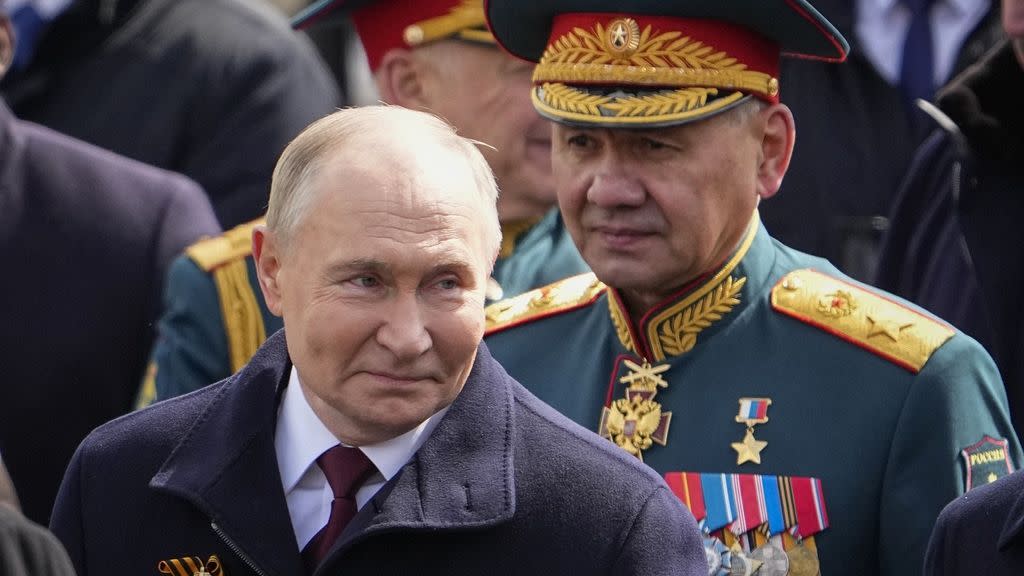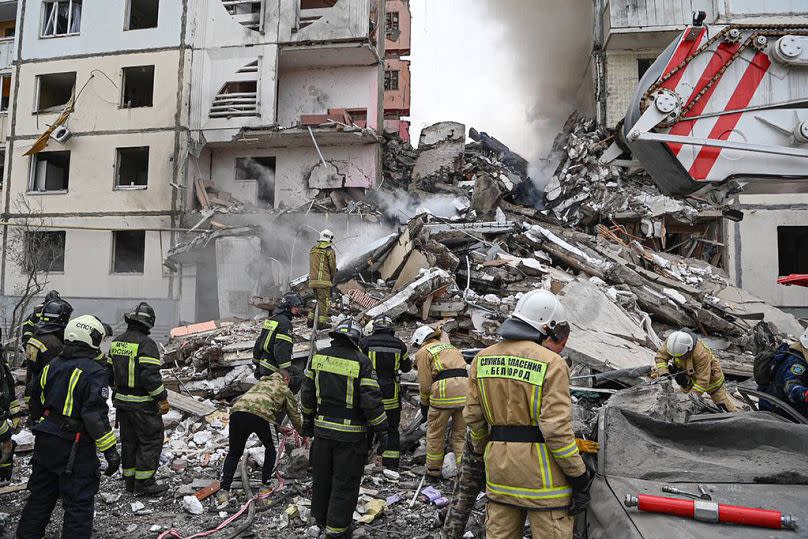Putin appoints new defence minister as Shoigu takes over National Security Council

- Oops!Something went wrong.Please try again later.
- Oops!Something went wrong.Please try again later.
- Oops!Something went wrong.Please try again later.
Russia’s President Vladimir Putin has signed a decree appointing Sergei Shoigu as secretary of Russia’s national security council, replacing Nikolai Patrushev.
The appointment comes after Putin proposed to appoint Andrei Belousov as the country’s defence minister instead of Shoigu, who has served in the post for years. The reshuffle comes as Putin starts his fifth presidential term and as the war in Ukraine drags on for the third year.
The change comes weeks after Timur Ivanov, a Russian deputy defence minister in charge of military construction projects, was jailed pending an investigation and trial on charges of bribery.
In line with Russian law, the entire Russian Cabinet resigned on Tuesday when Putin began his fifth presidential term at a glittering Kremlin inauguration.
68-year-old Shoigu has served as defence minister since 2012, and is widely seen as a key figure in Putin's decision to send Russian troops into Ukraine. Shoigu himself will take over from Nikolai Patrushev on the country's security council with Patrushev's role remaining unclear.
Russian forces push towards Kharkiv
The announcement came as thousands more civilians have fled Russia's renewed ground offensive in Ukraine’s northeast that has targeted towns and villages with a barrage of artillery and mortar shelling.
The intense battles have forced at least one Ukrainian unit to withdraw in the Kharkiv region, capitulating more land to Russian forces across less defended settlements in the so-called contested grey zone along the Russian border.
By Sunday afternoon, the town of Vovchansk, among the largest in the northeast with a pre-war population of 17,000, emerged as a focal point in the battle.
Volodymyr Tymoshko, the head of the Kharkiv regional police, said that Russian forces were on the outskirts of the town and approaching from three directions.
“Infantry fighting is already taking place,” he said.
A Russian tank was spotted along a major road leading to the town, Tymoshko said, illustrating Moscow's confidence to deploy heavy weaponry.
Analysts say the Russian push is designed to exploit ammunition shortages before promised Western supplies can reach the front line.
Ukrainian soldiers said that the Kremlin is using the usual Russian tactic of launching a disproportionate amount of fire and infantry assaults to exhaust their troops and firepower. By intensifying battles in what was previously a static patch of the front line, Russian forces threaten to pin down Ukrainian forces in the northeast, while carrying out intense battles farther south where Moscow is also gaining ground.

Moscow accuses Kyiv of missile strike on residential building
Meanwhile, a 10-story apartment building partially collapsed in the Russian city of Belgorod, near the border, killing at least eight people and injuring 20 others. Russian authorities said that the building collapsed following Ukrainian shelling. Ukraine hasn't commented on the incident.
Ukrainian President Volodymyr Zelenskyy said that halting Russia’s offensive in the northeast was a priority, and that Kyiv’s troops were continuing counteroffensive operations in seven villages around the Kharkiv region.
“Disrupting the Russian offensive intentions is our number one task now. Whether we succeed in that task depends on every soldier, every sergeant, every officer,” Zelenskyy said.
The Russian Defence Ministry said Sunday that its forces had captured four villages on the border along Ukraine’s Kharkiv region, in addition to five villages reported to have been seized on Saturday. These areas were likely poorly fortified because of the dynamic fighting and constant heavy shelling, easing a Russian advance.
Russia bombards border city as major assault on Ukraine continues
Ukrainians flee Russian advance as footage shows decimated village
Ukraine’s leadership hasn't confirmed Moscow’s gains. But Tymoshko said that Strilecha, Pylna and Borsivika were under Russian occupation, and it was from their direction they were bringing in infantry to stage attacks in other embattled villages of Hlyboke and Lukiantsi.
Russian tactics in Vovchansk mirror those used in the battles for Bakhmut and Avdiivka in the Donetsk region, he said, in which heavy aerial attacks were accompanied by droves of infantry assaults.
“Now the Russians are simply wiping it (Vovchansk) off the face of the earth and advancing with the scorched earth method. That is, they first scorch a specific area and then the infantry comes in, and they always advance in this way,” he said.

